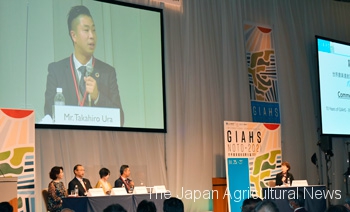
A symposium commemorating the 10th anniversary of the Noto region in Ishikawa Prefecture designated as the first GIAHS in Japan is held in Nanao, Ishikawa, on Nov. 26.
ISHIKAWA, Nov. 27 – Participants of the International Conference on Globally Important Agricultural Heritage Systems (GIAHS), held in Nanao, Ishikawa Prefecture, adopted a communique on Nov. 26, calling for continuing sustainable use of natural resources, ecosystems and harmony with environment cultivated in GIAHS sites.
The GIAHS is a project established by the United Nations’ Food and Agriculture Organization (FAO) with the purpose of maintaining the land use that protects biodiversity, traditional agriculture and farming methods that make full use of the environment, rural culture and landscapes. There are currently 62 systems in 22 countries that have been designated as GIAHS.
Officials of the FAO, the Ministry of Agriculture, Forestry and Fisheries, local governments and representatives from designated sites attended the conference in person or online to discuss their contribution to global issues such as climate change and biodiversity conservation, as well as measures for further utilization and conservation of GIAHS.
The communique included eight recommendations such as: sharing successful cases and lessons learned in GIAHS sites with other national and international agricultural stakeholders and policy makers; facilitating the creation of new economic activities that utilize the local resources of GIAHS sites; making an effective contribution in addressing global challenges and the Sustainable Development Goals; and encouraging support for potential GIAHS sites in developing countries.
At technical sessions, representatives from GIAHS sites in Sado, Niigata Prefecture, which promotes rice cultivation in harmony with endangered Japanese crested ibis, Shizuoka Prefecture, Kumamoto Prefecture, Brazil, Chile and Peru exchanged opinions on conservation of ecosystems and farmlands, as well as landscape restoration activities.

